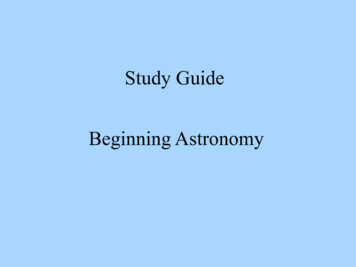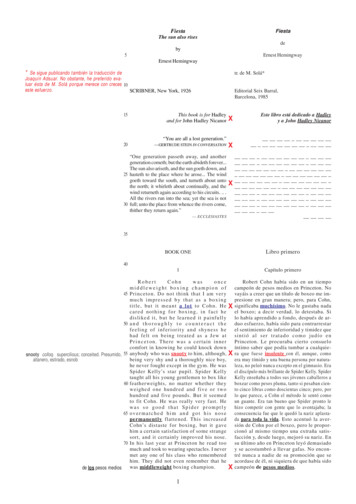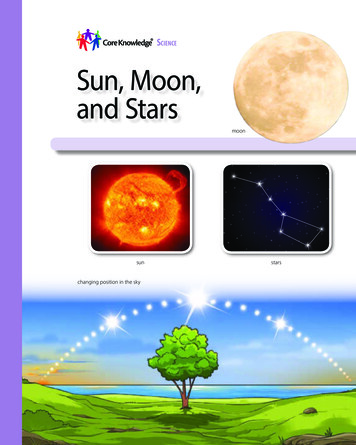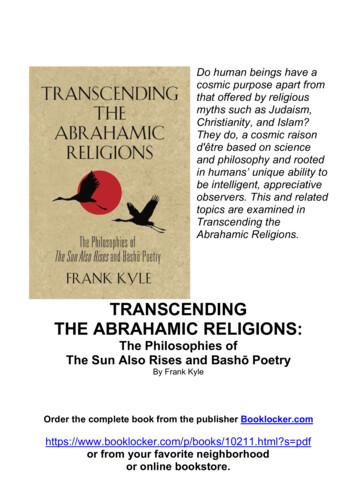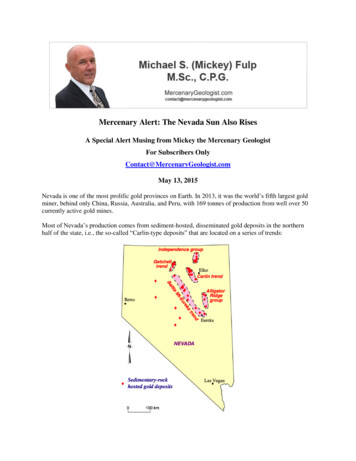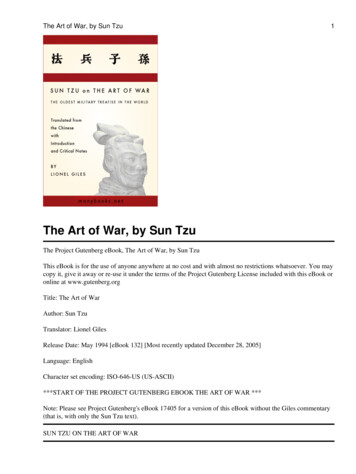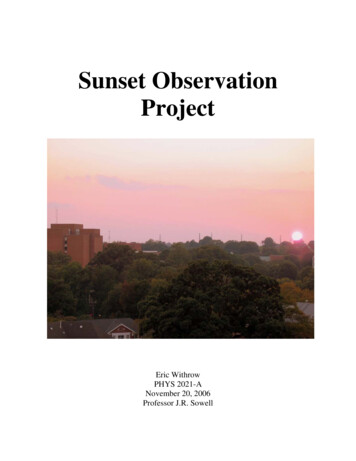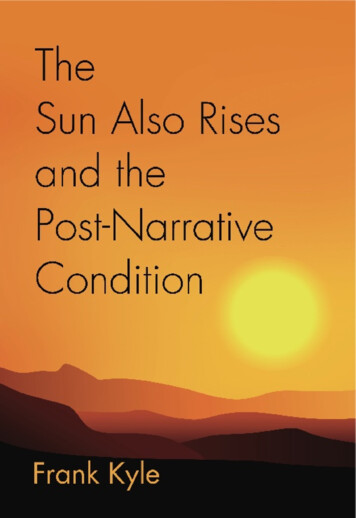
Transcription
The Sun also Rises presents the ontology, ethics, and aesthetics ofHemingway’s worldview by examining the post-Narrative condition that emergedafter World War I. It describes the postwar generation’s response to the war’snegation of the traditional meanings and values embedded in religious andsecular grand narratives.The Sun Also Rises and the Post-Narrative Condition suggests a neworientation to the world that might be called religious. The Great War proved theold anthropomorphic religions incapable of sustaining peace. To the contrary,history has shown that time and again they encourage conflict. Then thequestion that arises is whether there can be a religion without a god. A religionrequires that which is adored, revered, and cherished. The Sun Also Risessuggests that that the mundane world itself is such an object and that nature is the mysteriumtremendum, the mysterious primordial origin of all things. A new religion must encourage peace ratherthan conflict and reveal the mundane world as humanity’s true primordial progenitor and as such theonly object deserving of religious adoration. And, as Jake illustrates in The Sun Also Rises, in this newreligion each person achieves absolute value and self-realization through acts of appreciativeunderstanding.The Sun Also Rises And thePost-Narrative ConditionOrder the complete book s/8775.html?s pdfor from your favorite neighborhoodor online bookstore.Enjoy your free excerpt below!
The Sun Also RisesAnd the Post-Narrative ConditionFrank Kyle
Copyright 2016 Frank KyleISBN: 978-1-63491-682-0All rights reserved. No part of this publication may be reproduced, stored in a retrievalsystem, or transmitted in any form or by any means, electronic, mechanical, recording orotherwise, without the prior written permission of the author.Printed on acid-free paper.2016Revised Edition
Appendix D:Rediscovering the Earth: Jake Barnes and BashōEscaping the Dark Cave of JudeoChristian MythBecause of World War I Jake Barnes experience the death of God. Thelogical-moral implication that occurred in him and millions of other victims of that warwas that such a historical event was incompatible with the universe-creating, beneficentdeity. That might seem a great loss, but it could also be seen as a liberating event. Andwhy would the death of God be such a great loss if “he” “stood” by and allowed millionsof human beings to slaughter themselves? In this world, God made no difference in thelives of the people who died because of the war or to the people who lives were ruinedby the war even though they survived. What about Heaven? Heaven is nothing morethan fanciful speculation. Besides there is a contradiction in the idea of a God whoallows the most horrendous suffering to occur that “he” could easily prevent (he causeswars and plagues so can just as easily prevent them) and then rewards some (a minority)people with eternal bliss in the afterlife.World War I cut the umbilical cord of faith that not only kept Jake a child butalso prevented him from knowing the earth. We might take the word “knowing” in theBiblical sense. Once the jealous, overbearing, intrusive divine “father” was dead, Jakewas able to leave his “father’s” house and fall in love with the earth. JudeoChristianityhas always been a depreciator of the earth. It may be God’s creation but it exists in afallen and corrupt state. What is required of every believer is to turn away from the earthan look to God. In The Sun Also Rises when Jake enters a church to pray he turns hisback on the earth. Churches are enclosed spaces designed to separate the faithful fromthe earth. They have windows but their purpose is not to allow the believer to see outsidebut only allow light into the church, usually through stained glass designs depictingreligious scenes and symbols. A church is a physical embodiment of myth. Its purpose isto incarcerate the believer within a mythic structure.And the purpose of the minister or priest is to ensure that the believer takes thechurch with him or her, a portable myth that like the stained glass windows colorizes thebeliever’s experience and understanding of the earth. JudeoChristianity devaluates theearth in various ways, thus devalues a believer’s experience of the earth. Some ways aremore negative than others. How Pilgrims viewed black cats illustrates a more negativeview of the earth as a sin-ridden environment populated by demonic enticers. Especiallyperverted is JudeoChristianity’s puritanical view of the human body, especially thefemale body, which has been seen as having a demonic influence similar to that of blackcats. Thus the necessity of keeping the female body hidden—most often by the use ofconcealing clothing. In this sense, the view of the female body illustrates how theAbrahamic religions have viewed the earth and its inhabitants.458
The Sun Also Rises and the Post-Narrative ConditionThe Abrahamic depreciation of the earth originates with Judaism. This is clearlyillustrated in the ancient Jews hatred of peoples who worship the various forces ofnature. And it should be noted that Greek and Roman pagan temples were edifices thatopened upon the natural world rather than shut it out. However, it is Saint Paul whodeserves the most credit for depreciating life on earth. His negativity was passed on toSaint Augustine, who claims that nature’s creations possess beauty but that beauty is notinherent but derived from God. Ergo, nature’s creations are really God’s creations.317 Inhis Confessions Augustine says,317Augustine’s claims are always useful illustrations of how the religious mind reasons.First come the religious claims based on revelation (leaps of imagination), such as “Godcreated the Universe,” as described in the Book of Genesis. Scripture serves as the storagefacility for revelations dogmatically declared to be true. The Bible is like a museum filledwith ancient artifacts that are kept behind bullet proof (criticism proof) glass: observe but donot touch, not even to repair damage that naturally occurs over time.After storage, begins an endless process of contriving evidence (imaginativeinterpretations of empirical facts) to support the claims.* In part this is due to the fact that thepassage of time does, in fact, inflict considerable damage upon dogmatic “truths.”** Thisstage is a process of rationalization, the purpose of which is reparation, restoration andlegitimization. And the process is clearly endless given that has continued for over twomillennia. What makes the process so difficult is that the claims themselves cannot bemodified—only justified.*** However, the entire “reasoning” process still requires anongoing form of willful blindness to what actually occurs in nature and to the absoluteabsence of perceivable (rather than imagined or inferred) divine presence or activity innature.*A totally unnecessary process for religious (faith-based) claims since the religious mindassumes faith trumps reason. Yet, accepting religious claims only on faith apparently exasperatescertain religious minds, such as Saint Augustine and Ferguson? They seem to want for religious claimsthe same status and validity scientific claims have. But that’s wanting no-thing (spirit/God) to be something (like a peach). But the law of non-contradiction keeps getting in the way. They should take theadvice of uncritical true believers—such as Kierkegaard—and be satisfied with making the leap offaith, which for most believers, uncritical believers, is a very small leap, more like a hop.** Almost all, if not all, of Aristotle’s physics and laws of motion suffered such damage andrequired extensive repair or replacement. But his claims were scientific, thus not sacrosanct.***Care must be taken not to “throw out the baby with the dirty bath water.” To JudeoChristiansthis is exactly what Ernest Renan’s Life of Jesus does. The book offers a scholarly, critical-historicalexamination of Jesus’ life. It also celebrates Jesus as a great wise man, perhaps history’s greatest wiseman. However, the critical-historical approach makes it impossible to accept Jesus as a God-man:godly, yes; divinely inspired, yes; but himself divine, no.His chapter on miracles offers an illustration of what I mean. Renan says that the ability toperform miracles was recognized as a “privilege frequently conferred by God upon men.” (249) TheSynoptic Gospels are replete with Jesus’ miracles. The miracles were essential to establishing divinityof Jesus. Renan says Jesus was reluctant to perform miracles but others, including his disciples,expected miracles of him. So far so good, but then he says, “We will admit, then, without hesitation,that acts which would now [19th century!] be considered acts of illusion or folly, held a large place inthe life of Jesus.” (256) In one sentence Renan repudiates one of the mainstays of Jesus’ divinity.459
Frank Kyle“O Lord, who are beautiful, made these things, for they are beautiful; you whoare good made them, for they are good; you who are made them, for they are.Yet they are not so good, nor are they so beautiful as you, nor do they even be insuch wise as you, their creator. Compared to you, they are neither good, norbeautiful, nor real.” (Bk. 11; ch. 4. Trans. by Ryan.)Contradictorily, in the very next line he claims that “We know all this,” even though our“knowledge” is “ignorance” compared to God’s knowledge. The most important notionhere is the absolute worthlessness of the earthly realm in comparison with God. Ifanything here on earth has value, it does only because that value is derived from God.Augustine’s intent is to encourage believers to do what he does, constantly focus onGod. All the good things of nature should be treated as mirrors reflecting God’s imageor presence. To appreciate an orange for itself is a sin because God should be the objectof appreciation because God created the orange. Good earthly things (and I know of noother) become sinful things if they become objects of reverence. That is an ever presenttheme in the Old Testament. Again, the strangeness of this view of nature is the absenceof God. Nowhere in an orange is God to be found.The French Catholic friar Pierre-Marie Emonet seems to recognize God’sapparently absence as a serious obstacle to religious belief. No one, not the saints Pauland Augustine, suffer more from God sickness than Emonet. As a preacher and writerhe devoted his life defending the belief in God. Why God would need any human to dothis is one of the great mysteries of the JudeoChristian deity. Why doesn’t “he” simplymake an appearance so that people can be certain of “his” existence? The apparentanswer is that is not how the JudeoChristian game works. It’s a game that is based onchallenging people to believe what is impossible to believe, such as to believe that anorange is given by God in spite of there being no evidence of this. Those who believe inspite of the lack of evidence get to live happily ever after in Heaven. Those who can’tAnd it’s not helpful to the authority of the religion and its people represented by Jesus whenRenan says in the same chapter, “The admirable treatise, ‘On Sacred Disease,’ by Hippocrates, whichset forth the true principles of medicine on this subject, four centuries and a half before Jesus, had notbanished from the world so great an error” (253; italics mine). The reference is to epilepsy and used inthe context of Jesus’ performing exorcisms. The assumption of the religious mind was that demons“pervaded all minds” and “seized hold of the bodies of certain persons and made them act contrary totheir will.” (252) Hippocrates, on the other hand, declared that the sacred disease “is no more sacredthan other diseases” (Wikipedia, “On the Sacred Disease”).What Renan reveals is that the Greek science long ago offered a truer way of understandinghuman illness than did Jewish superstition. Yet, because Judaism would take control of the RomanEmpire empirical science would be crushed under the heel of religious superstition. And it wouldn’t beuntil Renan time that epilepsy would be treated as a neurological disorder by the French neurologistJean-Martin Charcot and the great error would be banished, at least in modern societies.460
The Sun Also Rises and the Post-Narrative Conditionmake the leap of faith will live unhappily ever after in Hell. It’s a very strange game forGod to be playing.Emonet attempts to use metaphysical magic—appeals to transcendentalsubstance, essence, and being—to establish the existence of God in the orange or rose ortree, but he fails. But that is not the issue here. The issue is his depreciation of nature. Hesays in his book of metaphysical magic—God Seen in the Mirror of the World—“It ison account of the poverty of things that the intellect can find the reason for their beingonly by leaving this world” and heading off to the world where God lives. “Things,” hesays, “are poor in their act of being. They are poor in their very roots.” (41) Earlier in thebook he provides the above quotation from Augustine. Toward its end he says, “in thedepths of things, perfections are found whose sole Cause and Bestower is God” and that“the world is suspended from God” and that “God is the Being of every being.” (102)This way of thinking is an act of desperation—not celebration—on the part of a theist.So desperate for God that he must convince others in order to convince himself. At leastso it seems to me.This view hollows out the value of each and every natural entity andphenomenon. It transforms the natural world into a puppet show in which God is themaker of the puppets and the puppeteer. Worst of all is that it transforms nature into ameans to an end (the revelation of the divine) rather than seeing nature’s creations asends in-themselves. Far more than science, JudeoChristianity transformed nature’screations into objects of utility, that is, objects of relative worth. It was not science thatfirst disenchanted the world but JudeoChristianity, with the help of Plato’s metaphysicsof Forms or Ideas, adopted and corrupted by JudeoChristianity by having the Formsserve as God’s thoughts, which Plato never, ever intended.318 Nature is a fruit basket318Plato’s depreciation of the objects of this world was solely epistemological. Typicalof many philosophers Plato’s believed humanity’s raison d'être was thinking and knowing.He went so far as to claim that thinking was for humans a means to salvation. I believethinking (cogitation, meditation, intellectual investigation and analysis, etc.) is a reallyspecial ability, but I don’t believe that it is any more valuable or meaningful than being aparent, farmer, fisherman, mechanic, or artist. And most of humanity would agree with me.Let’s face it, knowing (mapping) the human genome has to be very interesting, but isknowing that blueprint more meaningful than giving birth to and parenting a human baby? Oris doing that scientific work more meaningful than raising, teaching, or playing with a child?No. Is the botanical understanding (the idea) of an orange of greater value or moremeaningful than an actual orange? No, and I believe most botanists would agree with me.They love knowing about plants because they love plants even more than they love knowingabout them. Their knowledge is inspired by love.And then there are those abstract qualities such as beauty and goodness. Plato wouldplace the idea of beauty above a beautiful object, which, he believed, expresses beauty onlyimperfectly. But what is beauty in-itself? The Platonic claim that there is an absolute,standard form of beauty is simply wrong. But let’s assume that the essence of beauty can bedefined: Beauty possesses x, y, and z characteristics. So how is that definition of beauty461
Frank Kylesuperior to and of greater value than a beautiful object, such as a sunset? The fact is thedefinition of beauty or the truth of beauty is not in-itself beautiful. Plato would say that themathematical definition of a sphere is superior to an actual sphere, because, in words of theJesuit priest and historian of philosophy Frederick Copleston, the abstract standard isimmutable, constant, perfect and eternal. In the case of the abstract, perfect sphere, thosecharacteristics may be true, but the abstract (definitional) sphere is not superior to or ofgreater value than an imperfect sphere such as the moon. Copleston also gives an example ofseven apples plus three apples equaling ten apples.* The apples are denigrated because theyare mutable and pass away whereas the numerical equation doesn’t. To me this is nonsense,and I believe most scientists (perhaps not mathematicians) would agree. An apple is a marveldeserving of reverential appreciation. It is miraculous in the original sense of the word—thatwhich causes wonder.*See Copleston’s A History of Philosophy Vol 2: Medieval Philosophy (Image Books, 1993), 59.Thus, Plato, believing thinking is humanity’s highest calling, would most likely givegreater value to knowing about humans and oranges than to the entities themselves. TheHebrew religion had always view the world in the way Plato does. The things of the worldhad value because they had been invented and created by God. An orange has practical valueas an eatable fruit, but its supreme value is serving as a reflection—imperfect, of course—ofGod’s goodness and wisdom. Augustine believed that any praise—great or small—for thingsof this world should be redirected toward God. And this is the view of JudeoChristianity: thatthe things of this world have not absolute value and any value they do have is derived fromtheir creator, God. So when JudeoChristian Americans celebrate Thanksgiving, they givethanks to God not to the turkey that has lost its life to feed the family, nor to the cows thatprovided the various dairy products, nor to apples, raisins, yams, potatoes, beans, Brusselsspouts, lettuce, spinach, chestnuts, pumpkins, wheat, or any of the other eatables enjoyed atThanksgiving, and certainly not to nature, because doing so would be forms of idolatry andpaganism.JudeoChristians recognize the practical value of the things of this world, but that value isnot considered absolute. From before the time of Saint Augustine to today, illustrated byEmonet’s theosophy, JudeoChristians have utilized a modified version of Plato’s philosophyto give rational credence to their mythological claim that God created the world in a rationalrather than in an unintelligently manner. In other worlds, Jewish and JudeoChristiantheologians or mythologians have used Greek philosophy to give the JudeoChristian myth theappearance of being a rational explanation of the origin and structure of the universe and itsoccupants. Whereas for Plato the value of the things of this world was their ability to triggerawareness of their perfect prototypes, JudeoChristians valued them as a rickety ladder thatleads to God, their supposed creator and humanity’s source of salvation and damnation. Inboth cases, the things of this world have only subordinate value, and both Plato andJudeoChristians would prefer skipping them altogether going directly to the truth or to God.Oddly, however, in both cases doing so would eliminate the philosophical andtheological games played by Plato (and his followers) and JudeoChristians that actually giveto them life’s ultimate purpose or raison d'être. It would be like getting a card in the game ofMonopoly that says Advance to Go and Win the Game. In the JudeoChristianity game it462
The Sun Also Rises and the Post-Narrative Conditionwould say Advance to God and Skip Life on Earth. The game played by philosophers is thesearch for truth. For JudeoChristians it’s obedience to God and hopefully qualifying foreternal life in Heaven. Yet, both Platonic philosophers (in particular, Neo-Platonists) andJudeoChristians would skip the game—the living of life—if they could go directly to whatthey perceive as life’s destination, which is otherworldly. In ancient times skipping the gameof life is exactly what JudeoChristian martyrs sought to do. Other JudeoChristians withdrewfrom the lifeworld by escaping to convents, monasteries, or deserts. Abandonment of thematerial realm of earthly existence was the objective of both Neo-Platonist philosophers(isolated in their ivory towers) and JudeoChristians, which logically depreciated earthlyexistence.JudeoChristianity distorts Plato’s philosophy by transforming the prototype forms oressences that are reflected imperfectly in each thing into mental ideas. These forms were notfor Plato mental ideas but blueprints or patterns. But a blueprint alone can’t produce anything.A maker is needed. So Plato had God, the Demiurge, existing apart from the essenceblueprints, serve as the maker. He was like a divine chef who would follow an infinitely longrecipe book to cook up the items on the menu for our universe. Theoretically, I suppose, thenumber of possible things must be close to infinite. The chef also had this amazing singleingredient call matter that could be used to produce all the items in the cookbook.Interestingly, the Demiurge wasn’t the kind of deity one worshipped. He wasn’t thatinteresting. It was the blueprints that were truly fascinating because through them one couldunderstand the complex reality of the world. All the demiurge provided was muscle, what wewould call energy. It’s also interesting that Aristotle’s God couldn’t really be worshipped. Heor It was a divine mainspring mechanism that kept the world operating but was totally deaf toany form of prayer.What the JudeoChristianity did was to insert the cookbook into God’s mind. This wastheologically beneficial in a number of ways. Perhaps most important it gave rationalplausibility to God’s creation of the universe. By using Plato’s philosophy to describe howGod did it, the divine creative process seemed more believable. It also gave JudeoChristians ahandle on the nature of God. Though essence of God “himself” was/is absolutelyunknowable, at least worshipers could read “his” mind. Any God that not only thought aboutoranges and butterflies but created them so humans could enjoy them had to be both powerfuland benevolent. Finally, if it is assumed that the things of this world were created from God’sideas (in addition to benefit humans), then there must have been a creator. Consequently,Plato’s theory of forms or ideas could be used as a persuasive argument for the existence ofGod.Now let’s go back to Plato and his heavenly blueprints used by the divine Demiurge tocreate all the things of the world. The root of the word Demiurge is worker. Thus, as notedearlier, this divinity isn’t very interesting, not nearly as interesting as Zeus, Apollo, Dionysus,Hera, Aphrodite, Artemis. Athena, Demeter, so many cool goddesses. These divinecharacters are interesting in the way people are because they are humans writ large. Theyhave lives. They interact with one another the way humans do, even mingle with humans.Their combined lives are an Olympian soap opera. They are psychologically complex andfascinating, in part because they reveal just how humans behave when they acquireextraordinary power—often selfishly and destructively. Undoubtedly, a lot can be learned463
Frank Kyleabout people by studying the gods, who are basically deified humans. That goes for Yahwehas well.In Plato’s worldview what is most interesting is what can be known. So for him what ismost interesting are the forms or essences of things (what they are). Plato thinks like ascientist in that he is all about knowing the world. However, his big mistake was believing aperson could know all about the world just by thinking and confabulating with other thinkers.He believed that because he assumed that within a person’s soul there was a hidden filecabinet that contained all the information about the world. So unlike for his star studentAristotle, empirical investigation and observation were not essential to learning about theworld. Okay, so the abstract forms or essences depict precisely the reality of things. In asense, they provide the kind of information you get when you look up something like a peach(Prunus persica) on Wikipedia, though the encyclopedia definition also includes lots ofempirical information. Peaches are wonderful entities, and, as Wikipedia illustrates, haveeven inspired beautiful works of art. The dictionary even tells us that the word peach is usedto describe a person who is excellent, as in “She’s a peach.” And there is theAmericanism—peachy keen, excellent, fine, or worthy.However, being a philosopher (a lover of knowledge) Plato was more interested in theidea than the thing itself. As the reader knows peaches can be appreciated in various ways.And perhaps Plato himself would have valued an actual peach more highly had he theopportunity to see and eat one. But this is my main point: without the essences or forms ofthings to contemplate, Plato would have no raison d’être because there would be nothing forhim to contemplate. He would be a rational soul floating about in the void. Even his artisandeity would be idle because he wouldn’t have any blueprints to follow to make things. Inother words, though Plato valued the formal rational abstracts of things above thingsthemselves, which he considered to be only imperfect copies of the abstracts, the abstracts arethe essences of the things that exist in this world.So though Plato appears to desire to escape from the material world, actually what he isescaping to are purer expressions of the things of this world. Thus, what Plato really values,whether or not he admits it, are the things of this world. Yet, only a nutty professor wouldprefer their ghostly, disembodied forms to things themselves. The Wikipedia‘s formaldescription of a peach is hardly superior to an actual peach. Imagine reading about peachesbut being unable to experience a real peach. That would be dissatisfying. If Americans haddriven bison into extinction, as they tried to do and almost did, being able to read about themwould hardly compensate for the lost of the species. Back to peaches, knowing about peachesdoes not compare to holding, smelling, seeing, and eating one. If Plato would think so, thenhe would be a fool. There are non-existing, imaginary beings such as unicorns that we canknow, though what we know are imagined descriptions of them. Yet, actual horses are farmore meaningful than imaginary unicorns—just as human beings are more meaningful thanangels (and though the Bible refers to innumerable angels, in the Book of Daniel “tenthousand times ten thousand,” I have never encountered a single one).So Plato was wrong to believe that the formal blueprint of a thing is superior to the thingitself. I believe most people would agree a fifty-dollar bill that can be spent is superior to theidea of a hundred-dollar bill. So what is most interesting and enjoyable to know in Plato’sdivine workshop is not god but the ideas god uses to create to fashion the world. And the same464
The Sun Also Rises and the Post-Narrative Conditioncan be true for the JudeoChristian god. All JudeoChristians, as far as I know, believe the ideasfor all the things found in the universe first originated in the mind of God. “He” didn’t juststumble upon them. If they didn’t originate in God’s mind, then the JudeoChristian godwould not be any more interesting than Plato’s Demiurge. But what’s left if those ideas areseparated from God “himself”? JudeoChristianity does say that the essence of God is otherthan the ideas “he” used to create the universe. That makes sense. A peach and God aredifferent entities even if God created the peach. One could argue that the goodness of thepeach reflects God’s goodness and the existence of peaches reflects God’s generosity. Butthen there are all those things that are not so good for humans, such as deadly bacteria,viruses, funguses, poisonous insects and animal, crop-eating insects, etc. Wikipedia providesa long list of bacterial, viral, and fungal diseases that afflict peaches. So perhaps it’s better forour image of God to separate “him” completely from the things of this world, though that’sprobably not possible.But then what is left? JudeoChristians tell us that God is pure being, pure act,self-sufficient, and free. You probably know the story about the emperor who wore noclothes, written by Hans Christian Andersen, but nobody would tell him for fear of beingchastised. But a child blurts out that the emperor is wearing no clothes. Well, I’m going toplay here the role of that child. God is pure being. The notion pure being is nonsense, thoughJudeoChristian philosophers have worked very hard to make sense of this nonsensical notion.Why? Because the being of God must, of course, be pure. The word being in this sense is totreat the verb to be as a gerund, that is, as a noun. To ski can be treated as a noun: skiing, theactivity. But the root of being is to be, to exist in some manner or way. So peaches arebecause they exist. Skiing is because the activity exists. A dog can be fat, fat being an existingcharacteristic. All things have being in that they exist in some manner, even unicorns exist ifonly in the imagination. But there is no being apart from some existing thing. So we can sayof a peach that it is, meaning that it exists. We can also say a peach is pinkish-yellowish, issweet, is easily bruised, etc., because these qualities are (exist) in the peach. Now the Jewshave God define himself as the “I am that I am.” How about the is that is? You see God can’tbe an entity, which would limit “him,” (more accurately It). So God is pure being, the is thatis. Or the No-thing that is. God is unlike the rest of us poor creatures because “he” gets to bewithout being anything in particular. God is radically special, radically other. That’s why Ihave nothing in common with “him.” I prefer the sweet and beautiful company o
The Sun also Rises presents the ontology, ethics, and aesthetics of Hemingway’s worldview by examining the post-Narrative condition that emerged after World War I. It describes the postwar generation’s response to the war’s negation of the traditional meanings and v
